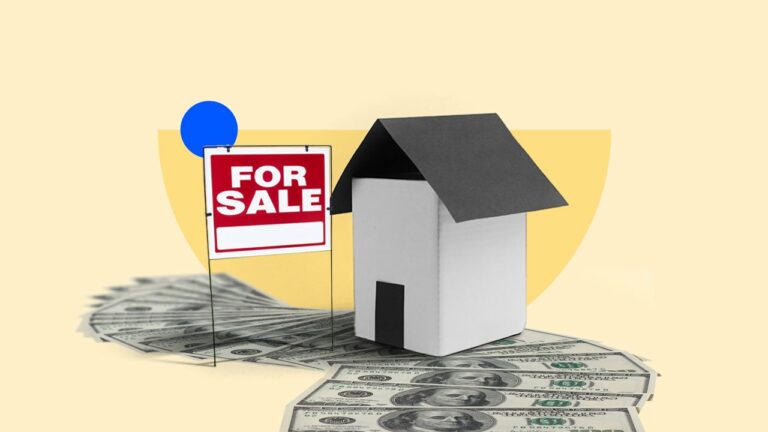When preparing to sell your home, getting the property into pristine show-ready shape can feel overwhelming — and cost a fair amount too. But instead of sinking more money into it when what you really want is to get rid of it, there’s another option to consider: selling the home as-is. This tells buyers that there will be no changes made, no concessions, no bargaining — what you see is what you get.
I speak from experience. When my father passed away, I decided to sell his house in as-is condition rather than put a lot of time, effort and money into fixing it up. This is my story — plus pros, cons and tips if you’re thinking of doing the same.
“As-is” is not, strictly speaking, a legal term — rather, it’s a contractual term. In real estate transactions, it means that the seller makes no guarantees or representations about the property’s condition or the working order of its features, and will do nothing to change the condition or features. And, crucially, it means that the buyer accepts these terms in purchasing the property.
I sold my father’s house as-is — here’s what I learned
The time had come to sell my old Kentucky home. My 90-year father had died, and I had no desire to move back to my birthplace. Built in the French Provincial style by my parents in 1963, the house was beautiful, with a pool and tennis court, surrounded by woods. But it hadn’t been updated in 15 years, since my mom’s death, and in his decline, my dad had let things go.
“Spare yourself the expense of renovating and the hassle of negotiating,” friends and real estate pros advised me. They thought people would want the property for the land, a three-acre lot, and the location, a peaceful suburb only 20 minutes from downtown Louisville. So I decided to sell the place in its existing state, as-is.
We listed it at $650,000. After some frivolous nibbles, a serious offer came in: $600,000. My broker said “take it,” but — feeling emboldened by experience in eBay bidding wars — I countered with $625,000. Sold! Well, that was easy, I thought.
Until the requests began.
I’d allowed the buyers a generous period of time to inspect the property and plan their renovations. But I wasn’t prepared for the pop quizzes that followed: Did the septic lines run under the tennis court? When was the oil tank last lined? Was the county ever going to run gas lines out to the neighborhood? Each one was accompanied by a follow-up question: If this turns out to be a big expense for us, can you adjust the asking price?
Each time, I furnished the requested info as best I could while ignoring the hints about the price. Then, just one week before the scheduled closing, the buyers suddenly got scared the house might have asbestos. Would I pay for a special inspection and removal if it were true? If not — basically a threat, not a hint this time — the sale was off.
I panicked: Could I afford, not just financially but emotionally, to put the house back on the market, especially since the prime summer selling season was nearly over?
But after a careful look at our purchase and sale agreement, sanity returned. “Remind these folks of the contractual facts of life,” I instructed my broker. They had agreed, in writing, to buy the home in its current state, with no repairs or concessions on my (the seller’s) part. That was the deal; that’s what “as-is” means. If they reneged now, I would sue them for breach of contract — and probably win, a real estate attorney who looked at the agreement told me.
After a tense few days, they finally backed down, and the closing went through as planned. I signed remotely, having canceled my flight during my moment of panic. After closing costs, the broker’s fee and paying off the mortgage, I netted a small profit.
Do I have regrets about selling the house as-is? To be honest, yes, a little. Not so much about the money — I was resigned to getting less — but because it didn’t save me as much hassle as I’d expected. Still, the as-is status did give me the grounds, and the guts, to stand firm at a crucial moment. I think Daddy, a lawyer and master negotiator, would have been proud.
Common reasons to sell a house as-is
Much of my decision to go the as-is route had to do with convenience. But people opt to sell homes in their current state for a variety of reasons, usually related to money, time or effort — or a combination of the three.
Finances: Home-improvement projects can be very expensive. There are already plenty of costs that add up when selling a house, and a home in disrepair can raise those costs even further. Selling a house as-is allows you to skip that expense.
Timeliness: The as-is status can also expedite your timeline. Let’s say you need to relocate for work and sell your home as quickly as possible. Undertaking a renovation project would seriously delay your listing. If there’s enough demand out there from buyers, selling as-is can help speed up the process.
Convenience: Sometimes, selling as-is just seems the most practical course. In cases where a home is inherited (like mine) or needs to be sold following a divorce, for example, the seller might opt for an as-is sale to avoid the hassle and responsibility of preparing the house for the market.
Does selling as-is lose you money?
Broadly speaking, properties listed as-is do tend to be priced lower: Buyers just aren’t going to offer as much if they know they’ll have to invest in repairs and renovations once they take possession.
It’s hard to set a specific percentage on how much less you will make selling as-is versus fixing the home up before listing it. Much depends on the condition of the property, its location and how competitive the local real estate market is. In a strong seller’s market, the price gap typically found between an as-is sale and a regular sale will be smaller.
And if a home is on a prime piece of property or in a highly desirable neighborhood — especially one that doesn’t see new listings often — its condition matters less because the location is paramount. That certainly characterized my situation. My family home was in a subdivision that had only 12 houses, all widely spaced throughout hilly terrain with river views. Lots as large as ours were getting rare in fast-growing Louisville, my broker noted.
Pros and cons of selling a house as-is
Just like any real estate transaction, an as-is home sale has upsides and downsides.
Pros
Fewer costs: Avoiding expensive repairs helps you avoid potential financial strain. Plus, selling a house as-is means there’s no pressure to make it look perfect — no need to pay for professional staging inside or enhanced curb appeal outside — which translates to less of a ding on your bank account.
Faster process: Rather than waiting weeks or even months for repairs and other projects to be completed, you can list your home on the market and start showing it immediately. The sooner you list it, the sooner it can sell — my own listing was up within weeks of signing the broker’s contract.
Smoother closing: The upfront knowledge that no repairs will be made means there’s less negotiation and no haggling back and forth over concession requests, which helps smooth the path toward a straightforward, uncomplicated closing (in theory, at least).
Cons
Reduced profit: Homes sold as-is generally fetch a lower price, due to the anticipated repair costs the buyers will have to shoulder. Skipping the repairs saves you money on the front end, but you can’t expect to price an as-is property the same way you would if it were in move-in-ready condition. If my father’s house had been thoroughly modernized and in tip-top shape, I might have listed it for $100,000 more, or even higher.
Fewer buyers: While some folks love a fixer-upper, many house-hunters are looking for move-in-ready properties and don’t feel comfortable taking on a “project.” So,the number of interested buyers will likely be less for an as-is listing, and selling could take longer. In my case, it took four months before a serious offer came along.
Financing challenges: Potential buyers might face difficulties in securing a loan for a house in poor shape, which can prolong the selling timeframe. It might even lead to the deal falling through, particularly if the home appraisal comes in short of the agreed-upon price.
5 tips for how to sell a house as-is
These tips can help get you to a smooth and successful as-is sale:
1. Be upfront about the home’s condition
Make it clear from the get-go — in the listing and any other marketing materials — that the home is being offered in as-is condition and that you will not be making repairs or addressing problems. And put it in writing in your purchase and sale agreement as well.
Keep in mind: Make it clear from the get-go that you will not be making repairs or addressing problems.
It may be useful to get a pre-listing home inspection so that you can be specific about exactly what work is needed and offer transparency to potential buyers. Providing inspection details upfront can instill trust, making the situation more appealing to a buyer and possibly accelerating the sale. The inspection report can also help you determine a fair list price.
2. Remember seller’s disclosures
Selling as-is doesn’t excuse you from disclosing known defects. For example, if you know there’s a mold problem or a crack in the foundation, you’re legally obligated to inform the buyer. If you misrepresent the condition of the property, you could potentially be held liable for any issues that arise.
Nearly all states across the country have laws in place outlining what home sellers must disclose. Many have specific disclosure forms that sellers are legally obligated to complete and supply to buyers. And in many places, real estate brokers and agents are also required to disclose any known defects.
Keep in mind: You’re responsible for disclosing information that’s within your personal knowledge — you’re not required to go searching for problems.
“Known” is the operative word here, though: You’re responsible for disclosing information that’s within your personal knowledge — you’re not required to go searching for problems. I carefully read and signed Kentucky’s disclosure statement, attesting that there were no issues I was aware of.
3. Keep things as tidy as possible
You might not be investing in any major upgrades, but that doesn’t mean you should give up on presenting your home in its best light. You can still make sure the property is neat and tidy. Keep the yard mowed, surfaces clean, beds made and dishes put away, and minimize clutter as much as possible. Be ready for viewings at all times, as you would with any home sale.
Keep in mind: Looking dated is one thing, looking derelict is another.
You might also invest in some small fixes beforehand, as I did at my broker’s recommendation: replaced broken window panes, smoothed over wall cracks and repainted several rooms. All told, it came to about $1,600 — a small price to pay to spruce things up. Looking dated is one thing, looking derelict is another.
4. Know how low you can go
Think about what your rock-bottom price would be — the lowest offer you’d be willing to accept — and be ready to make a quick counter-offer if someone bids lower. That’s what I did: I had a $600,000 threshold in my head. Anything above that, I figured, was gravy.
Speaking of compromises: Even with an as-is listing, some buyers will still try to negotiate based on home inspection results, as mine did. If a few hundred (or thousand) dollars is all that’s standing in the way of making a deal, you can always agree to make a repair. Or, trim your asking price accordingly.
Keep in mind: If a few hundred dollars is all that’s standing in the way of making a deal, you can always agree to make a repair.
However, if they’re asking for major modifications, as mine were, stand firm. I provided paperwork that proved recent repairs or attested to the condition of the HVAC and plumbing systems and other infrastructure. But I drew the line at agreeing to finance special inspections or carry out expensive upgrades — that would negate the whole point of an as-is sale.
5. Find a trusted real estate agent
It might be tempting to try to sell your house on your own to avoid paying a Realtor’s commission fee, but it’s probably smarter to enlist a professional who has experience selling as-is homes. An experienced agent can help you set a price that accurately reflects the value of the home, and show it in a way that helps buyers see its potential.
Keep in mind: An experienced agent can show the home in a way that helps buyers see its potential.
My broker and his team certainly aimed for “the fixer-upper folks,” as he dubbed them. And I will always greatly appreciate the professional way he drew up our contract, making the as-is clause watertight enough for me to rely on it when I had to.
I sold my father’s house as-is — here’s what I learned
The time had come to sell my old Kentucky home. My 90-year father had died, and I had no desire to move back to my birthplace. Built in the French Provincial style by my parents in 1963, the house was beautiful, with a pool and tennis court, surrounded by woods. But it hadn’t been updated in 15 years, since my mom’s death, and in his decline, my dad had let things go.
“Spare yourself the expense of renovating and the hassle of negotiating,” friends and real estate pros advised me. They thought people would want the property for the land, a three-acre lot, and the location, a peaceful suburb only 20 minutes from downtown Louisville. So I decided to sell the place in its existing state, as-is.
We listed it at $650,000. After some frivolous nibbles, a serious offer came in: $600,000. My broker said “take it,” but — feeling emboldened by experience in eBay bidding wars — I countered with $625,000. Sold! Well, that was easy, I thought.
Until the requests began.
I’d allowed the buyers a generous period of time to inspect the property and plan their renovations. But I wasn’t prepared for the pop quizzes that followed: Did the septic lines run under the tennis court? When was the oil tank last lined? Was the county ever going to run gas lines out to the neighborhood? Each one was accompanied by a follow-up question: If this turns out to be a big expense for us, can you adjust the asking price?
Each time, I furnished the requested info as best I could while ignoring the hints about the price. Then, just one week before the scheduled closing, the buyers suddenly got scared the house might have asbestos. Would I pay for a special inspection and removal if it were true? If not — basically a threat, not a hint this time — the sale was off.
I panicked: Could I afford, not just financially but emotionally, to put the house back on the market, especially since the prime summer selling season was nearly over?
But after a careful look at our purchase and sale agreement, sanity returned. “Remind these folks of the contractual facts of life,” I instructed my broker. They had agreed, in writing, to buy the home in its current state, with no repairs or concessions on my (the seller’s) part. That was the deal; that’s what “as-is” means. If they reneged now, I would sue them for breach of contract — and probably win, a real estate attorney who looked at the agreement told me.
After a tense few days, they finally backed down, and the closing went through as planned. I signed remotely, having canceled my flight during my moment of panic. After closing costs, the broker’s fee and paying off the mortgage, I netted a small profit.
Do I have regrets about selling the house as-is? To be honest, yes, a little. Not so much about the money — I was resigned to getting less — but because it didn’t save me as much hassle as I’d expected. Still, the as-is status did give me the grounds, and the guts, to stand firm at a crucial moment. I think Daddy, a lawyer and master negotiator, would have been proud.
Common reasons to sell a house as-is
People opt to sell homes in their current state for a variety of reasons, usually related to money, time or effort — or a combination of the three.
Finances: Home-improvement projects can be very expensive. There are already plenty of costs that add up when selling a house, and a home in disrepair can raise those costs even further. Selling a house as-is allows you to skip that expense.
Timeliness: The as-is status can also expedite your timeline. Let’s say you need to relocate for work and sell your home as quickly as possible. Undertaking a renovation project would seriously delay your listing. If there’s enough demand out there from buyers, selling as-is can help speed up the process.
Convenience: Sometimes, selling as-is just seems the most practical course. In cases where a home is inherited (like mine) or needs to be sold following a divorce, for example, the seller might opt for an as-is sale to avoid the hassle and responsibility of preparing the house for the market.
Does selling as-is lose you money?
Broadly speaking, properties listed as-is do tend to be priced lower: Buyers just aren’t going to offer as much if they know they’ll have to invest in repairs and renovations once they take possession.
It’s hard to set a specific percentage on how much less you will make selling as-is versus fixing the home up before listing it. Much depends on the condition of the property, its location and how competitive the local real estate market is. In a strong seller’s market, the price gap typically found between an as-is sale and a regular sale will be smaller.
And if a home is on a prime piece of property or in a highly desirable neighborhood — especially one that doesn’t see new listings often — its condition matters less because the location is paramount. That certainly characterized my situation. My family home was in a subdivision that had only 12 houses, all widely spaced throughout hilly terrain with river views. Lots as large as ours were getting rare in fast-growing Louisville, my broker noted.
Pros and cons of selling a house as-is
Just like any real estate transaction, an as-is home sale has upsides and downsides.
Pros
Fewer costs: Avoiding expensive repairs helps you avoid potential financial strain. Plus, selling a house as-is means there’s no pressure to make it look perfect — no need to pay for professional staging inside or enhanced curb appeal outside — which translates to less of a ding on your bank account.
Faster process: Rather than waiting weeks or even months for repairs and other projects to be completed, you can list your home on the market and start showing it immediately. The sooner you list it, the sooner it can sell — my own listing was up within weeks of signing the broker’s contract.
Smoother closing: The upfront knowledge that no repairs will be made means there’s less negotiation and no haggling back and forth over concession requests, which helps smooth the path toward a straightforward, uncomplicated closing (in theory, at least).
Cons
Reduced profit: Homes sold as-is generally fetch a lower price, due to the anticipated repair costs the buyers will have to shoulder. Skipping the repairs saves you money on the front end, but you can’t expect to price an as-is property the same way you would if it were in move-in-ready condition. If my father’s house had been thoroughly modernized and in tip-top shape, I might have listed it for $100,000 more, or even higher.
Fewer buyers: While some folks love a fixer-upper, many house-hunters are looking for move-in-ready properties and don’t feel comfortable taking on a “project.” So,the number of interested buyers will likely be less for an as-is listing, and selling could take longer. In my case, it took four months before a serious offer came along.
Financing challenges: Potential buyers might face difficulties in securing a loan for a house in poor shape, which can prolong the selling timeframe. It might even lead to the deal falling through, particularly if the home appraisal comes in short of the agreed-upon price.
5 tips for how to sell a house as-is
These tips can help get you to a smooth and successful as-is sale:
1. Be upfront about the home’s condition
Make it clear from the get-go — in the listing and any other marketing materials — that the home is being offered in as-is condition and that you will not be making repairs or addressing problems. And put it in writing in your purchase and sale agreement as well.
Keep in mind: Make it clear from the get-go that you will not be making repairs or addressing problems.
It may be useful to get a pre-listing home inspection so that you can be specific about exactly what work is needed and offer transparency to potential buyers. Providing inspection details upfront can instill trust, making the situation more appealing to a buyer and possibly accelerating the sale. The inspection report can also help you determine a fair list price.
2. Remember seller’s disclosures
Selling as-is doesn’t excuse you from disclosing known defects. For example, if you know there’s a mold problem or a crack in the foundation, you’re legally obligated to inform the buyer. If you misrepresent the condition of the property, you could potentially be held liable for any issues that arise.
Nearly all states across the country have laws in place outlining what home sellers must disclose. Many have specific disclosure forms that sellers are legally obligated to complete and supply to buyers. And in many places, real estate brokers and agents are also required to disclose any known defects.
Keep in mind: You’re responsible for disclosing information that’s within your personal knowledge — you’re not required to go searching for problems.
“Known” is the operative word here, though: You’re responsible for disclosing information that’s within your personal knowledge — you’re not required to go searching for problems. I carefully read and signed Kentucky’s disclosure statement, attesting that there were no issues I was aware of.
3. Keep things as tidy as possible
You might not be investing in any major upgrades, but that doesn’t mean you should give up on presenting your home in its best light. You can still make sure the property is neat and tidy. Keep the yard mowed, surfaces clean, beds made and dishes put away, and minimize clutter as much as possible. Be ready for viewings at all times, as you would with any home sale.
Keep in mind: Looking dated is one thing, looking derelict is another.
You might also invest in some small fixes beforehand, as I did at my broker’s recommendation: replaced broken window panes, smoothed over wall cracks and repainted several rooms. All told, it came to about $1,600 — a small price to pay to spruce things up. Looking dated is one thing, looking derelict is another.
4. Know how low you can go
Think about what your rock-bottom price would be — the lowest offer you’d be willing to accept — and be ready to make a quick counter-offer if someone bids lower. That’s what I did: I had a $600,000 threshold in my head. Anything above that, I figured, was gravy.
Speaking of compromises: Even with an as-is listing, some buyers will still try to negotiate based on home inspection results, as mine did. If a few hundred (or thousand) dollars is all that’s standing in the way of making a deal, you can always agree to make a repair. Or, trim your asking price accordingly.
Keep in mind: If a few hundred dollars is all that’s standing in the way of making a deal, you can always agree to make a repair.
However, if they’re asking for major modifications, as mine were, stand firm. I provided paperwork that proved recent repairs or attested to the condition of the HVAC and plumbing systems and other infrastructure. But I drew the line at agreeing to finance special inspections or carry out expensive upgrades — that would negate the whole point of an as-is sale.
5. Find a trusted real estate agent
It might be tempting to try to sell your house on your own to avoid paying a Realtor’s commission fee, but it’s probably smarter to enlist a professional who has experience selling as-is homes. An experienced agent can help you set a price that accurately reflects the value of the home, and show it in a way that helps buyers see its potential.
Keep in mind: An experienced agent can show the home in a way that helps buyers see its potential.
My broker and his team certainly aimed for “the fixer-upper folks,” as he dubbed them. And I will always greatly appreciate the professional way he drew up our contract, making the as-is clause watertight enough for me to rely on it when I had to.
This article was originally published by a www.bankrate.com . Read the Original article here. .







